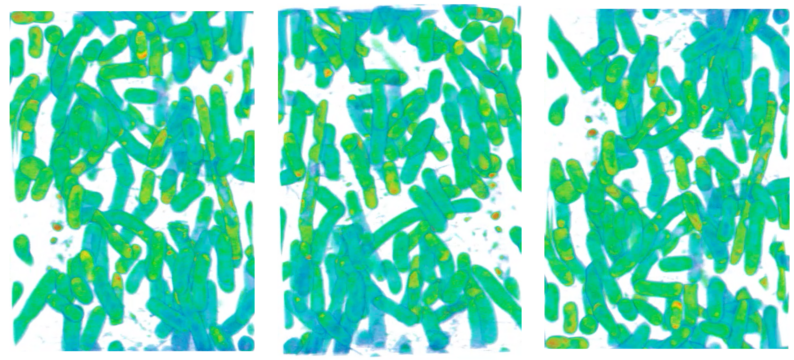Microbes naturally contain an inexhaustible source of beneficial chemicals and can use a range of carbon sources. However, in their native state, most microbes only use a fraction of the carbon types and can produce only small quantities of these molecules. Revealing the potential of a microbe to produce maximal quantities of a specific desired chemical is an important challenge to develop bioproduction hosts for the bioeconomy. In the Host Engineering Group, we use genomics and synthetic biology to optimize both carbon utilization as well as the production of desired molecules in engineered microbes. Our goals are to develop microbes that can accumulate high levels of fuel products, tolerate inhibitory pretreatment byproducts and consume all forms of carbon in the biomass. We work closely with other teams at JBEI to achieve this vision, as well as DOE facilities like the JGI and EMSL. Our work complements research at the ABPDU to develop strains that have good performance at commercially relevant scales.
Projects
- Bacterial hosts (Pseudomonas spp, C. glutamicum, S. cerevisiae, and R.toruloides): Discovery and optimization of carbon utilization regimes, tolerance mechanisms to biomass-related inhibitors and final products to generate robust, scalable production platforms
- Adaptive Lab Evolution across a range of strains and final phenotypes (e.g. enhanced tolerance and carbon utilization)
- Genome Scale metabolic model and functional genomics driven microbial chassis development
- Optimization of High Throughput Strain Development Pipelines
Featured Media
- Biosensor-driven strain engineering reveals key cellular processes for maximizing isoprenol production in Pseudomonas putida
- The Future of Sustainable Biomanufacturing is Microscopic Factories
- C&EN: Carbenes created in a cell
- Fast-Track Strain Engineering for Speedy Biomanufacturing
- Genome Insider S2 Episode 3: Better Living Through Bioenergy
- Microbe Genetic “Rewiring” Technique Promises a Boom in Biomanufacturing of Fuels, Materials and Chemicals
- Blue Pigment from Engineered Fungi Could Help Turn the Textile Industry Green
Featured Publications
- Biosensor-driven strain engineering reveals key cellular processes for maximizing isoprenol production in Pseudomonas putida. Science Adv 2025
- Sustainable production of 2,3,5,6-Tetramethylpyrazine at high titer in engineered Corynebacterium glutamicum. Journal of Industrial Microbiology and Biotechnology 2024
- Maximizing microbial bioproduction from sustainable carbon sources using iterative systems engineering. Cell Reports 2023
- Generation of Pseudomonas putida KT2440 Strains with Efficient Utilization of Xylose and Galactose via Adaptive Laboratory Evolution. ACS Sus Chemistry & Engineering 2021
- Development of dual‐inducible duet‐expression vectors for tunable gene expression control and CRISPR interference‐based gene repression in Pseudomonas putida KT2440 Microbial Biotechnology 2021
- Genome-scale metabolic rewiring improves titers rates and yields of the non-native product indigoidine at scale. Nat. Commun. 2020
- Engineering Corynebacterium glutamicum to produce the biogasoline isopentenol from plant biomass hydrolysates. Biotechnology for Biofuels. 2019
- Sustainable bioproduction of the blue pigment indigoidine: Expanding the range of heterologous products in R. toruloides to include non-ribosomal peptidesGreen Chemistry 2019
- A Cas9-based toolkit to program gene expression in Saccharomyces cerevisiae NAR 2016
- Development of an coli strain for one-pot biofuel production from ionic liquid pretreated cellulose and switchgrass. Green Chemistry 2016
Featured Intellectual Property
- Host cells and methods for producing unnatural terpenoids using a novel artificial metalloenzyme
- A CRISPR-Based and Metabolic Modeling Guided Strategy to Maximizing Indigoidine Production
- High Titer Production of Indigoidine in Rhodosporidium toruloides
- Modified Host Cells Having tolerance to α-Olefins.
- Efflux Pumps to Increase Microbial Tolerance and Biofuel Production
- Discovery of a hexose transporter variant in Saccharomyces cerevisiae that allows growth on xylose










